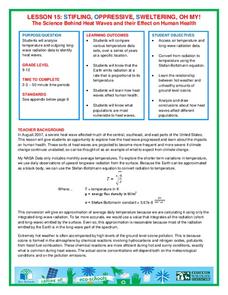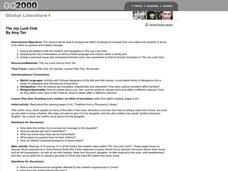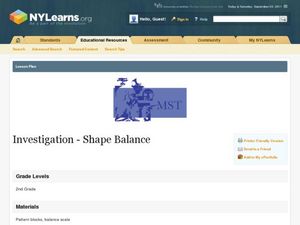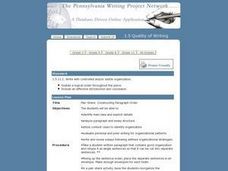National Wildlife Federation
Stifling, Oppressive, Sweltering, Oh My!
Looking for a hot date? Pick any day in August, statistically the hottest month in the United States. The 15th lesson in the series of 21 instructs pupils to investigate the August 2007 heat wave through NASA data, daily temperature...
PBS
Women's History: Parading Through History
Want to teach your pupils about debate, effective speech techniques, propaganda, and the women's movement? The first in a sequential series of three, scholars analyze real propaganda images from the the historic women's movement, view a...
NOAA
History's Thermometers
How is sea coral like a thermometer? Part three of a six-part series from NOAA describes how oceanographers can use coral growth to estimate water temperature over time. Life science pupils manipulate data to determine the age of corals...
Polar Trec
Ozone Data Comparison over the South Pole
Did you know the hole in the ozone is seasonal and filled by January every year? The lesson uses scientific measurements of the ozone over the South Pole to understand patterns. Scholars learn that the hole grew bigger annually before...
Curated OER
I Am Golden
Learners become familiar with patterns, the Fibonacci Sequence, and the Golden Ratio. They see how many places these occur. They have practical applications for using the calculator and making charts to extend patterns.
Curated OER
Ecosystems
Students create plots of land in three different ecosystems and use AppleWorks to collect data for research. This lesson includes a downloadable worksheet and can be accomplished in four days.
Curated OER
Patterns of Settlement in Early Alabama
Fourth graders study the settlement of Alabama. They collect data from the U.S. census website and answer questions regarding settlement patterns in the counties of Alabama in 1820. They write a paagraph describing where they would have...
Curated OER
Geometric Figures
Students identify two and three dimensional shapes and use appropriate geometric vocabulary to write a description of the figure by taking pictures of geometric figures in their own environment.
Curated OER
TLC--Lesson Plans
Students in the grades kindergarten and 2nd grade interact with each other. They (2nd graders) faciliate one on one tutoring in the areas of reading and writing with the kindergartens. Students in the 2nd grade promote mentoring skills.
Curated OER
The Joy Luck Club
Students read The Joy Luck Club and analyze the effect of having to translate from one culture into another. Students trace patterns that link mothers and daughters in the novel, and write an essay comparing personal experiences to those...
Curated OER
The Monarch Butterfly Watch
Students explore monarch migration through the Journey North web site. In this butterfly lesson plan, students use the internet to identify a butterfly's migration pattern. Students write in electronic journals.
Curated OER
"A Pig is Big"
Students explore the concept of big, bigger, and biggest. They examine and classify items by size, listen to and discuss the book "A Pig is Big," complete a fill in the blank activity, and create a tri-fold that illustrates two items...
Curated OER
Investigation: Shape Balance
Second graders explore geometry by utilizing pattern blocks. In this shape identification lesson, 2nd graders view the characteristics for several different geometric shapes and create them using building blocks and other classroom...
Curated OER
Write A Description
Students practice composing sentences that pertain to the description of a picture. They use critical observation skills in order to derive the best details. The sentences are required to follow the correct subject and verb pattern.
Curated OER
Reading Artifacts
Learners explore and analyze categorizing objects, material culture artifacts, from a variety of perspectives, to consider the story behind each one. They research skills by assessing how to look at artifacts as cultural outsiders would....
Curated OER
Bring No Poor Articles with You
Students compare their travel needs to homesteaders from the late 1800's in this multi-instructional activity unit. Students analyze a historic document, explain modes of transportation of the homesteaders, and articulate the personal...
Curated OER
Interpreting the Evidence
Students find out about the social changes that caused the collapse of important ancient civilizations in Central America, Mesopotamia, the southwestern United States, and western Africa.
Curated OER
Floods
Students examine the devastation floods may cause. In this current events lesson, students analyze a photograph of a flood scene to determine what was taking place when the photograph was taken. Students respond to the provided...
Curated OER
Legacy of Colonialism
Students explore the extent of colonialism from the early periods in the 1500's to the later years in the mid 1900's. They explain how colonization differed in regions around the world and examine the lasting effects on the colonized...
Curated OER
Miao Minorities
Students conduct Internet research to identify the cultural aspects of the Miao minority group from China. They, in groups, create a brochure with their research and write an essay on the predicted future of the Miao culture.
Curated OER
Once in a Blue Moon
Third graders identify the phases of the moon. They use technology to access websites on the Internet dealing with the moon.
Curated OER
Problem Solving Using Power Polygons
Students investigate geometric shapes by creating figures on a plane. In this polygon lesson, students complete a worksheet based on the angles in a power polygon. Students identify the different types of polygons and define their...
Curated OER
Pair-Share: Constructing Paragraph Order
Students write with controlled and/or subtle organization. They identify the main idea and explicit details. Students analyze paragraph and essay structure. They utilize context clues to identify organization.
Curated OER
Dating Sedimentary Strata
Students investigate how the age of sedimentary strata is determined. In this sedimentary strata lesson, students work through problems that show that geological history covers millions of years. They distinguish between relative and...























